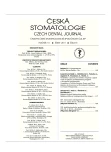Malignant fibrous histiocytoma of the tongue
Authors:
P. Antonová 1; L. Dzan 2
; A. Šimůnek 3; L. Vavřičková 3
Authors‘ workplace:
Krajská nemocnice, a. s., oddělení patologie, Liberec
1; Krajská nemocnice, a. s., oddělení ÚČOCH, Liberec
2; Stomatologická klinika LF UK a FN, Hradec Králové
3
Published in:
Česká stomatologie / Praktické zubní lékařství, ročník 111, 2011, 5, s. 117-124
Category:
Case Report
Overview
Sarcomas are neoplasm’s of mesenchymal origin and represent less than 2% of all cancers. The histological classification is often difficult (there are more than 50 subtypes of sarcoma) and they are characterized according to the tissue from which they develop, with 4/5 arising from soft tissues and 1/5 from bone. Among the most common sarcomas in adults are malignant fibrous histiocytoma (40%) and liposarcoma (25%), less common is osteosarcoma, angiosarcoma, and fibrosarcoma. The most common sarcoma in childhood is rhabdomyosarcoma. Sarcomas can arise anywhere in the body, the most common sites are the extremities (50%), followed by the trunk and retroperitoneum (40%) but only 10% involve the head and neck region.
Malignant fibrous histiocytoma (MFH) is an aggressive tumor of soft tissue, mainly affecting the lower and upper extremities, retroperitoneum or abdominal cavity. Primary MFH of soft tissues of the oral cavity is rare (1–3%).
Tru-cut biopsy or open biopsy is used to provide material for the histopathological determination of the nature of the tumor. The biopsy technique for quick frozen mesenchymal tumors is not ideal and is burdened by a number of difficulties. A large number of relatively rare sarcoma subtypes place huge demands on the experience and knowledge of the pathologists to determine the correct diagnosis, without which it is not possible to choose the most appropriate treatment strategy. In terms of histological features, of importance are: the degree of Ki 67 (mitotic index), the level of cell differentiation and the presence of necrosis. The histopathological grade correlates with levels of recurrence and overall survival. The authors present an unusual case of extensive malignant fibrous histiocytoma of the tongue, focusing on the histopathological picture.
Key words:
malignant fibrous histiocytoma (MFH) – undifferentiated pleomorphic sarcoma – sarcoma of the tongue
Sources
1. Antonescu, C. R.: The role of genetic testing in soft tissue sarcoma. Histopathology, roč. 48, 2006, s. 13–21.
2. Blay, J., Cesne, A.: Adjuvant chemotherapy in localized soft tissue sarcomas: Still not proven. Oncologist, roč. 14, 2009, s. 1013–1020.
3. Colville, R. J., Charlton, F., Kelly, C. G., Nicoll J. J., McLean, N. R.: Multidisciplinary management of head and neck sarcomas. Head Neck, roč. 27, 2005, s. 814–824.
4. Fletcher C. D. M., et al.: Tumors of Soft Tissue and Bone. Pathology and genetics. World Health Organization Classification of Tumors. Lyon: IARC Press, 2002, s. 12–18, 120–126.
5. Goldblum J. R., Weiss S. W., Enzinger F. M.: Enzinger and Weiss’s Soft Tissue Tumors (Fifth edition). Mosby Elsevier, 2007, s. 403–427, ISBN 0-323-04628-2.
6. Chen, Y., Lin, L., Lin, Ch.: Malignant fibrous histiocytoma of the tongue. J. Laryngol. Otol., roč. 115, 2001, s. 763–765.
7. Jain, A., Sajeevan, K. V., Babu, K.G., Lakshmaiah, K. C.: Chemotherapy in adult soft tissue sarcoma. Indian J. Cancer, roč. 4, 2009, s. 274–287.
8. Laco, J., Šimáková, E., Slezák, R., Tuček, L., Mottl, R., Špaček, J., Ryška, A.: Low grade myofibroblastický sarkom: kazuistika. Čes.-slov. Patol., roč. 42, 2006, č. 3, s. 150–153.
9. Landa, J., Schwartz, L. W.: Contemporary imaging in sarcoma. Oncologist, roč. 14, 2009, s. 1021–1038 .
10. McMains K. C., Gourin C. G.: Pathology: Sarcomas of the Head and Neck, 2009, dostupný z WWW: <http://emedicine.medscape.com/article/871284-overview>.
11. Potter B. O., Sturgis E. M.: Sarcomas of the head and neck. Surg. Oncol. Clin. N. Am., roč. 12, 2003, s. 379–417.
12. Rapidis A. D., Andressakis D. D., Lagogiannis G. A., Douzinas E. E.: Malignant fibrous histiocytoma of the tongue: Review of the literature and report of case. J. Oral Maxillofac. Surg., roč. 63, 2005, s. 546–550.
13. Schmidt, G. P., Reiser, M. F., Baur-Melnyk, A.: Whole-body MRI for the staging and follow-up of patiens with metastasis. Eur. J. Radiol., roč. 70, 2009, s. 393–400.
14. Šafářová, M., Moztarzadeh, O.: Liposarkom jazyka (Kazuistické sdělení). Čes. Stomat., roč. 108, 2008, č. 6, s. 149–151.
15. Španihel J., Weber P., a kol.: Maligní fibrózní histiocytom břišní dutiny mimoorgánové lokalizace. Interní Med., roč. 3, 2007, s. 143–145.
16. Tateishi, U., Yamaguchi, U., Seki, K., et al.: Bone and soft tissue sarcoma: Preoperative staging with fluorine 18 fluorodeoxyglucose PET/CT and conventional imaging. Radiology, roč. 245, 2007, s. 839–847.
17. Thompson, L. D. R., Fanburg-Smith, J. C.: Tumors of Head and Neck. Pathology and genetics. World Health Organization Classification of Tumors. Lyon: IARC Press; 2005, s. 35–42.
18. Wang, Ch., Chang, Y., Ting, L., Yang, T., Ko, J., Lou, P. Malignant fibrous histiocytoma of the sinonasal tract. Head Neck, roč. 31, 2009, s. 85–93.
19. Žaloudík, J., a kol.: Diagnostika a léčba sarkomů měkkých tkání. Zdravotnické noviny, roč. 46, 2001, s. 30–34.
Labels
Maxillofacial surgery Orthodontics Dental medicineArticle was published in
Czech Dental Journal

2011 Issue 5
- What Effect Can Be Expected from Limosilactobacillus reuteri in Mucositis and Peri-Implantitis?
- The Importance of Limosilactobacillus reuteri in Administration to Diabetics with Gingivitis
-
All articles in this issue
- Malignant fibrous histiocytoma of the tongue
- Complications Connected to Late Diagnosis of Mandible Dentigerous Cyst
- Vascular Anomalies – Hemangiomas. Possibilities of their Diagnosis and Treatment
- Variability in Toll-like Receptor Genes and Their Relation to Occurrence of Periodontal Pathogens in Chronic Periodontitis
- Czech Dental Journal
- Journal archive
- Current issue
- About the journal
Most read in this issue
- Complications Connected to Late Diagnosis of Mandible Dentigerous Cyst
- Vascular Anomalies – Hemangiomas. Possibilities of their Diagnosis and Treatment
- Malignant fibrous histiocytoma of the tongue
- Variability in Toll-like Receptor Genes and Their Relation to Occurrence of Periodontal Pathogens in Chronic Periodontitis
